Ricochet is the best place on the internet to discuss the issues of the day, either through commenting on posts or writing your own for our active and dynamic community in a fully moderated environment. In addition, the Ricochet Audio Network offers over 50 original podcasts with new episodes released every day.
 Weekend Contest: The Best of Times
Weekend Contest: The Best of Times
I’m not persuaded that but for social media, we wouldn’t notice that the world’s a bit of a mess. But for a change, let’s leave Obama out of this.

Whether or not the circumstances objectively warrant our sense that the world is falling apart, few of us feel we’re living in the best of times. No doubt, we enjoy standards of health care, hygiene and physical comfort that would have astounded members of any previous society; no doubt, we enjoy extraordinary personal freedom; no doubt, we live in interesting times. But would anyone here disagree that we are nonetheless fearful, insecure, contentious, sour and pessimistic? If we are not worrying about war and terrorism, we are worrying about losing our jobs, nuclear proliferation, and cultural rot. Perhaps the cause of this is social media, perhaps not, but everyone senses this mood of deep unease, of constant self-reproach.
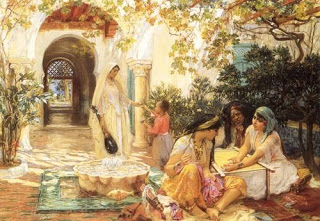
Let’s think about this in a different way. In rare moments in history, ordinary men and women have been uncommonly contented. By contented I mean precisely what those men and women meant: This is not my judgment of them; it is their judgment of themselves, reflected in their letters and their arts. They were contented with their social and political lives. They found their daily activities pleasurable. They considered themselves remarkably fortunate to be alive at that very moment, in that very place. They were sunny in disposition, at peace with themselves, and above all, optimistic. I’m not concerned here with the occasional contented individual, but with contented societies, ones that really existed. Historians and journalists are drawn to the awful—to brutishness and malaise, to war and plagues. There are fewer books about contented times. But these periods did occur, casting a warm golden glow over what is otherwise a long depressing slog.
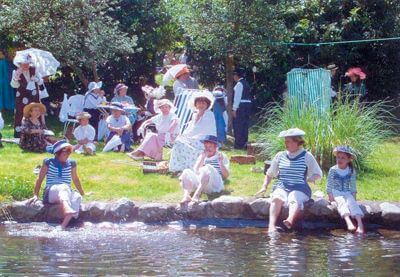
What makes a moment in human history one of the best of times? Certainly not scientific achievement or brilliance in the arts. Europe in the 17th century was a time of unparalleled scientific advances, but very few men and women alive then thought their epoch splendid, or comfortable, or even decent. Fifth Century Attic Greece was the most brilliant society ever known, but it was a world in the process of destroying itself, and everyone knew this, and so no one was happy in the plain, ordinary sense of the word.
I can think of perhaps five or six such episodes in world history. I propose:
- Rome under the Antonines, from roughly 160 AD to 220 AD.
- Baghdad under the Caliphate, from roughly 800 to 1000 AD.
- Western Europe under the peace of Innocent III, from roughly 1200 to 1300.
- France during the Belle Époque, from say 1880 to 1914.
- Vienna under the Emperor Franz Joseph, from 1865 to 1914.
- The United States under Dwight Eisenhower, from 1952 until 1963.
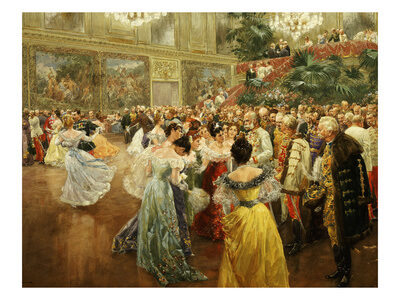
My list is obviously arbitrary: I haven’t included certain civilizations, Chinese and Indian civilization in particular, because I don’t know enough to make a case for them.
What do the periods above have in common? I note the following, and suggest that in all likelihood, these will be common features of all happy times:
- The best of times were placid. There were no major wars, civil upheavals, revolutions or epidemic diseases.
- The best of times were times in which change was incremental and slow.
- The best of times were times in which there were stable, long-lasting structures of civil and religious authority.
- The best of times were times when popular moods were neither cynical nor ironic, but rather earnest and dutiful.
- The best of times were times in which the arts of civilization—art, music, literature, but also woodworking, ceramics, pottery, cooking—flourished unobtrusively.
- The best of times were times in which religion was accepted as an aspect of life, but in which conformity to religious doctrine was not enforced beyond certain limits.
- The best of times were times of strong but limited state power.
- The best of times were times in which a strong and respected military kept external enemies at bay.
- The best of times were times in which both state bureaucracies and state legal systems functioned efficiently and were seen to function efficiently.
- The best of times were times in which marriage was seen as the normal standard of adult life.
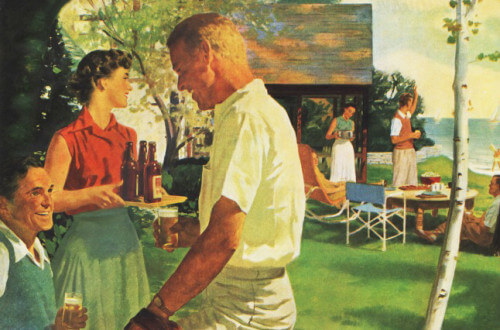
What do you think were the best of times, and why? Remember: I am not looking for times of genius, greatness, or heroism: I am looking for moments of general human contentment. I’m looking for moments that were dominated by vibrant and attractive men and women, people who were life-sized, engaging, personable, decent and accessible, but not by ones who were larger than life—those types, for better or worse, tend to occur in the worst of times.
Now here are the rules: Your entry must…
- Make a case for the period, in general, in fewer than 200 words. No copy-pasting, and no linking. Your own words only.
- In a separate comment, illustrate the contentedness of an ordinary man or woman of the epoch by appeal to their letters or their arts. (Copy-pasting is obviously fine.)
- I repeat: two comments total to argue for one epoch: one for your argument, one for your example.
- You may make the case for multiple epochs, but each requires a separate comment and separate example.
- The present time is excluded. I know some of us are very contented. But we’re “occasional contented individuals,” not a contented society.
The winner will receive this highly attractive and coveted image of a trophy.

Have a contented weekend, Ricochet!
Published in General




Most of the world lives in a “subsistence lifestyle” up to a few years ago. A large portion, still does. One doesn’t need to go to some obscure bush society to experience the joys of “subsistence lifestyle”.
As is often the case, Dickens said it best:
It was the best of times, it was the worst of times, it was the age of wisdom, it was the age of foolishness, it was the epoch of belief, it was the epoch of incredulity, it was the season of Light, it was the season of Darkness, it was the spring of hope, it was the winter of despair, we had everything before us, we had nothing before us, we were all going direct to heaven, we were all going direct the other way – in short, the period was so far like the present period, that some of its noisiest authorities insisted on its being received, for good or for evil, in the superlative degree of comparison only.
Charles Dickens, A Tale of Two Cities
Claire,
According to my father Brooklyn in the 1920s was a residential paradise. Tree lined quiet well kept streets. Happy children playing.
Of course, New York City, America was an incredible magnet for everyone in the world. Freedom and everything else too.
However, even in paradise things were not so good. My father felt oppressed and trapped by the city. He romanticized the country as was often the case. In 1924 when my father was 10 his Uncle Jim came by train from Iowa for a visit. Jim had a little culvert factory in a small town in Iowa. For my father this was the dream of dreams. Jim was a very nice guy and was good to my father. Ergo I am James. I just checked out my great uncle’s grave on-line (you and your post Claire got me to do this). It turns out they were anglicizing Yitzak (Isaac) to James back then. Nice to know. By the way it was my grandfather in NYC who anglicized the last name to Gawron. In Centerville, Iowa in the 1920s it was James Gavronsky. Maybe my father knew the real McCoy when he met him.
Anyway, all was not rosy in the 1920s because they led into the 1930s. When my father skipped his senior year and went to City College in 1930, he took a freshman literature class. There the teacher asked the class about F. Scott Fitzgerald (for sure). She asked “What do you think of Fitzgerald’s famous quote “The rich really are different.” My father said he answered “Well, the rich are different, they have money!”
You had to watch out for my father.
Regards,
Jim
PS I am sorry Claire that I probably have not fulfilled the requirements of the contest. Actually, I don’t really romanticize any particular epoch of History. It is the pure ideas that interest me. I’m a bit of a scavenger that way. Ideas too need a context as people do. History is a good thing.
I nominate Sweden, from 1890-1910 or so. It’s a fairly self-centered choice, because my favorite illustrator, Carl Larsson, lived in Sundborn with his wife and many charming children then, and I would love to go back in time and be their neighbor. Larsson made a living – a living! – as a painter of historic murals and book and magazine illustration. His wife, whom he had met in Paris studying art, was an artist too – a weaver and interior designer. If you page through the numerous illustrations he made of their home and family life, it is a tapestry of contentedness for what appears to be an average Swedish family.
Let me post some of those illustrations in the next comment so you can judge.
It was a time and place where . . .
Parents took delight in their children, and children were happy in studying their lessons.
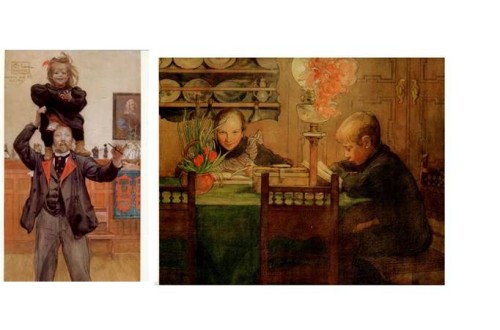
Men and women worked the land hard, but could take time to read for pleasure in the evening.
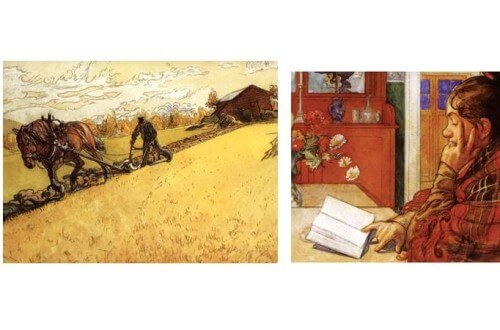
There were picnic lunches outside, and plentiful food for family feasts in the evening.
People respectfully worshipped each week as a matter of course, but festivities like “Name Days” – i.e. if you were named Andrew, there was a little party for you on St. Andrew’s day, Nov. 30 – were a time for music and flowers and jokes, celebrated at home.
And holidays brought everyone from grandparents to grandchildren and friends together for merrymaking.
I rest my case!
Also the time when more then 1/3 of the Swedish population high-tailed out of there for America.
People leave for a reason.
Oh great. Fat chicks and horse[CoC]
Let others praise ancient times; I am glad I was born in these.
Ovid